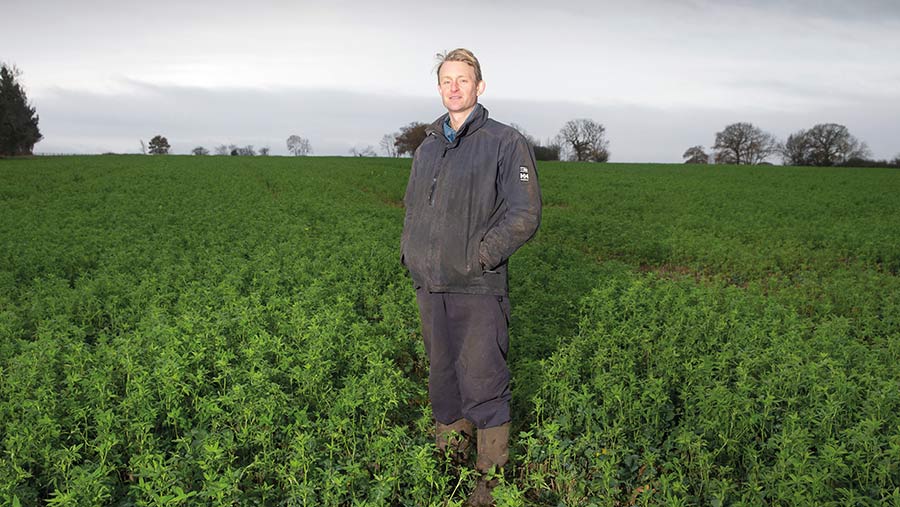RPA rules prevent farmer adding environmental options
 Max Chenery © Tim Scrivener
Max Chenery © Tim Scrivener A regenerative farmer who hoped to put more land into environmental stewardship has been told he must first repay almost £300,000 earned under an existing scheme.
Max Chenery, who farms an 800ha arable and beef farm on the Whatton Estate, near Loughborough, Leicestershire, said the ruling was over-zealous and went against government ideology.
See also: 2023 Countryside Stewardship opens with changes to expand the scheme
Mr Chenery explained that, in 2014, the farm was one of the last to take out a 10-year Higher Level Stewardship (HLS) agreement.
The agreement included low-input grassland, parkland, ancient monuments and wading bird options across the whole farm.
Over the past eight years, Mr Chenery said wildlife had benefited and he wanted to continue those options, while committing more land to boost nature recovery through Countryside Stewardship (CS).
“I felt applying for Mid Tier Countryside Stewardship was the right thing to do, for the environment and for the sustainability of the farm business,” he said.
“It’s also totally in line with what the government is telling us it wants us to do.”
Since Mr Chenery took out the HLS agreement, the Mid Tier options under CS have improved hugely.
Contract
But according to the Rural Payments Agency (RPA), such a switch to CS is not allowed, as he would be seen as reneging on his HLS contract.
The rules suggest that, if the HLS options are not maintained until the end of the 10-year agreement, the farmer will be liable to pay back all payments received.
That amounts to almost £300,000 since 2014, which Mr Chenery said was unaffordable.
While Mr Chenery said he understood why the rule was needed, to ensure the environmental work was completed, it was also acting against nature recovery and against government ambition.
“We are not saying we want to pull out of the HLS; this work would continue,” he said.
“The Mid Tier CS options would be complementary and build on what we are doing already.”
But for the next two-and-a-half years, until his HLS contract runs out, he cannot do this.
“So, the environment misses out, we can’t comply with the government’s ideal, and the business is on a less stable footing as our [Basic Payment Scheme] funding dwindles,” he added.
CLA support
Mr Chenery’s case is being championed by the Country Land and Business Association.
Senior land use adviser Harry Greenfield said keeping him locked into an agreement that is achieving less for the environment just for the sake of a rule makes no sense and is worth challenging.
“If Mr Chenery could switch to Mid Tier CS, he would be able to put large chunks of land into options like herbal leys, which are yielding recognised benefits for soil health,” Mr Greenfield said.
Some farms have put up to half or one-third of their land into these options at £115/ha, he added.
Another option for the Whatton Estate would be two-year legume crops at £569/ha.
This option is better for soil health compared to the current, unprofitable break crops.
“We hope that the RPA will see sense on this because, outside the HLS, other farmers are more able to be flexible with what they do.
“As it stands, the situation is just penalising someone for the sake of a rule.”
